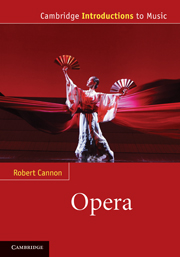Book contents
- Frontmatter
- Contents
- Tables
- Introduction
- Part I The seventeenth and eighteenth centuries
- Part II The nineteenth century
- Part III The twentieth and twenty-first centuries
- Chapter 13 The turn of the century and the crisis in opera
- Chapter 14 First modernism: Symbolist and Expressionist opera
- Chapter 15 The dramaturgy of opera: libretto – words and structures
- Chapter 16 Narrative opera: realistic and non-realistic
- Chapter 17 Radical narratives
- Chapter 18 Directors and the direction of opera
- Appendix 1 Motifs from The Ring used in Chapter 10
- Appendix 2 The development of singing voices in opera
- Appendix 3 The development of lyric theatre alternatives to ‘opera’
- Appendix 4 Some major operas and artistic and political events of the twentieth century, 1899--2008
- Glossary of key terms
- Notes
- Bibliography
- Index
Chapter 14 - First modernism: Symbolist and Expressionist opera
from Part III - The twentieth and twenty-first centuries
Published online by Cambridge University Press: 05 June 2012
- Frontmatter
- Contents
- Tables
- Introduction
- Part I The seventeenth and eighteenth centuries
- Part II The nineteenth century
- Part III The twentieth and twenty-first centuries
- Chapter 13 The turn of the century and the crisis in opera
- Chapter 14 First modernism: Symbolist and Expressionist opera
- Chapter 15 The dramaturgy of opera: libretto – words and structures
- Chapter 16 Narrative opera: realistic and non-realistic
- Chapter 17 Radical narratives
- Chapter 18 Directors and the direction of opera
- Appendix 1 Motifs from The Ring used in Chapter 10
- Appendix 2 The development of singing voices in opera
- Appendix 3 The development of lyric theatre alternatives to ‘opera’
- Appendix 4 Some major operas and artistic and political events of the twentieth century, 1899--2008
- Glossary of key terms
- Notes
- Bibliography
- Index
Summary
Debussy and Symbolism (Pelléas et Mélisande)
Pelléas et Mélisande and Wozzeck signal the true beginning of modernism in opera. Pelléas is revolutionary because of the kind of text Debussy needed to set, and the way in which he set it. A major preoccupation was how to get out of the impasse that Wagner had come to represent in music generally, and opera in particular, as Debussy himself wrote: ‘Contemporary dramatic music, however, embraces everything from Wagnerian metaphysics to the trivialities of the Italians – not a particularly French orientation. Perhaps in the end we will see the light and achieve conciseness of expression and form (the fundamental qualities of French genius)’ (Debussy, in Strunck, 1998: 1431–2). What he wanted was to ‘purify our music! Let us try to relieve its congestion, to find a less cluttered kind of music’ (1998: 1433). Just as painters and sculptors had turned to other, often ‘primitive’, traditions for new ways of looking at and representing the world, so Debussy turned to alternative forms of music encouraged by what he heard at the 1900 Paris Exposition Universelle:
The tuned drums of the east were a new source of rhythmic subtlety and excitement. The persistent use of the pentatonic scale altered and, for the moment, freshened melodic utterances. In the long-drawn tremolos of the percussion instruments, with their peculiar tuning, were promptings for those successions of ninths that subsequently were to become fingerprints on Debussy's manuscripts. In the minor pulsations of the Gamelan, Debussy found an antidote for the great surges of the Wagnerian orchestra.
(Thompson, 1965: 92)The result was not an imitation of the oriental, but an impulse to rethink how music might sound and be structured, and Debussy emphasised that:
I have undertaken a task which was perhaps beyond my powers. Not having any precedent, I find myself obliged to invent new forms. Wagner could be of use to me, but I have no need to tell you how ridiculous it would be even to try him. I could use his system in the succession of scenes, but I should want to retain the lyrical line without letting it be absorbed by the orchestra.
(Orledge, 1982: 37)- Type
- Chapter
- Information
- Opera , pp. 294 - 312Publisher: Cambridge University PressPrint publication year: 2012

